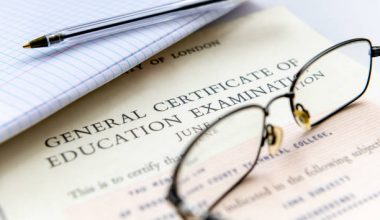Whether you are ready to go to college or not, smashing your GCSE in one sitting is an excellent record. While it is not an easy feat to achieve, starting early to prepare for your GCSEs is one crucial step to success.
When to start revising for GCSE is a vital question students aged 14 to 16 are seeking answers to. Individually, people have different learning styles, and you should be aware of yours by now.
However, if you are still at a loss with how long it takes you to master a thing, this article answers the question of when should you start revising for GCSEs.
Success in these exams can open doors to various opportunities in the future. This comprehensive guide explains the optimal timing for GCSE revision and provides valuable insights and practical advice to help you achieve exceptional results.
This article will also explore the best and possible timeline for GCSE revision and the best revision techniques you should adopt.
Table of contents
When Should You Start Revising for GCSEs?
The answer to this million-dollar question is not one-size-fits-all: When should you start revising for GCSEs? It depends on various factors.
However, a general rule is to begin your revision around 3 to 4 months before your GCSE exams.
This allows you ample time to cover all subjects thoroughly and reduces last-minute cramming stress.
For some types of learners, beginning six months before the examination date is an ample time to prepare for the day.
Read Also: The Night Before a GCSE Exam: A Survival Guide in 2024
The Best Timeline for GCSE Revision
Here’s a comprehensive timeline to help you plan your GCSE revision effectively:
#1. Early Stages (9-12 Months Before Exams):
In the early stages, focus on building a strong foundation in each subject. Pay attention in class, take thorough notes, and clarify any doubts. This will make later revisions easier and more productive.
#2. Midway Mark (6-9 Months Before Exams):
Around this time, start creating a study schedule that allocates sufficient time for each subject.
Begin by revisiting topics covered earlier and gradually increase the depth of your understanding.
#3. Intensive Revision (3-6 Months Before Exams):
As you approach the 3 to 6-month mark, intensify your revision efforts. Break each subject into manageable sections and allocate dedicated time slots for focused study sessions.
#4. Practice and Mock Exams (1-3 Months Before Exams):
In the final stretch, shift your focus to practice papers and mock exams. This will help you familiarize yourself with the exam format, improve time management, and identify areas that need further refinement.
#5. Final Review (2-4 Weeks Before Exams):
Revise key concepts, formulas, and facts during the last few weeks. Create concise summary notes and engage in active recall techniques to reinforce memory.
Read Also: How To Study For The ACT In Less Time | 2024 Timetable, Schedules
Strategies for Effective GCSE Revision:
Now that we’ve established the ideal timeline, let’s explore some strategies to make your GCSE revision productive and successful:
Create a Structured Study Plan:
Develop a detailed study plan that outlines your daily and weekly study goals. Prioritize subjects based on their complexity and your strengths and weaknesses.
Utilize Active Learning Techniques:
Passive reading won’t cut it. Opt for active learning methods such as summarizing, teaching imaginary students, or creating flashcards. These techniques enhance comprehension and retention.
Embrace Technology:
Leverage educational apps, online resources, and interactive videos to make your revision engaging and interactive. Platforms like Khan Academy and Coursera offer valuable lessons in various subjects.
Break It Down:
Divide your study sessions into manageable chunks. The Pomodoro technique, for example, suggests studying for 25 minutes and then taking a 5-minute break. This prevents burnout and enhances focus.
Stay Healthy:
A healthy body supports a healthy mind. Prioritize sleep, maintain a balanced diet, and engage in regular physical activity to keep your energy levels up and your brain sharp.
Seek Help:
Don’t hesitate to ask your teachers or peers for clarification on challenging topics. Join study groups to share knowledge and gain different perspectives on subjects.
Top GCSE Revision Techniques You Should Adopt
Maximize your efforts and achieve remarkable results with this top GCSE revision method – Active Recall.
Revising for your GCSE exams will no longer be an arduous task with the active recall technique. Here is how to effectively practice the active recall revision technique for GCSE:
Step 1: Create Flashcards
Start by creating flashcards for each topic or concept you need to revise. Write a concise question on one side and the answer on the other. Keep your questions clear and focused on key points.
Step 2: Test Yourself
Hold the flashcards question-side up and attempt to answer the question without looking at the answer. If you struggle with an answer, flip the card and review the information. Repeat this process for all your flashcards.
Step 3: Spaced Repetition
After testing yourself, sort the flashcards into two piles: cards you answered correctly and cards you struggled with. Focus on the cards you found challenging and review them more frequently using spaced repetition. This involves revisiting difficult cards at increasing intervals over time.
Step 4: Interleave Subjects
Interleave subjects by mixing different topics in your revision session to enhance learning. This prevents overreliance on recognition and forces your brain to work harder to retrieve information, leading to better retention.
Step 5: Teach a Friend
Teaching someone else reinforces your understanding of the material. Explain concepts to a friend or family member and encourage them to ask questions. This helps solidify your knowledge and identify areas that need further revision.
GCSE Revision Timetable Templates
Before crafting your timetable, take stock of your existing commitments, such as school hours, extracurricular activities, and part-time jobs. This will help you identify available study slots.
Establish clear study goals for each subject and topic. Select a timetable format that resonates with your learning style.
FAQs About GCSE Revision
Start your revision early and develop an effective revision plan. These are crucial steps in preparing for GCSEs
Starting early allows you to cover the syllabus thoroughly without rushing. However, revising too early might lead to forgetting some details closer to the exams.
If you find a subject challenging, seek help from teachers, online tutorials, or study groups. Don’t hesitate to ask questions—it’s a sign of determination.
Absolutely! Breaks are essential for maintaining focus and preventing burnout. Just ensure your breaks are timed and don’t become prolonged distractions.
While this is enough time for some students, it is advisable to start 6 months earlier.
Conclusion
The answer to when should you start revising for GCSEs lies in finding the balance between starting early enough to cover all material and avoiding burnout.
By following a well-structured study plan, embracing active learning techniques, and taking care of your well-being, you can confidently approach your GCSE exams and set the stage for academic success.
Every student is unique, so customize your revision approach to suit your learning style and preferences. With dedication, perseverance, and the right strategies, you can achieve your desired GCSE results and pave the way for a bright future.
References
- Explore Learning.co.uk – When to start GCSE preparation? – Explore Learning
- Quora.com – How long before GCSEs should I start revising?






